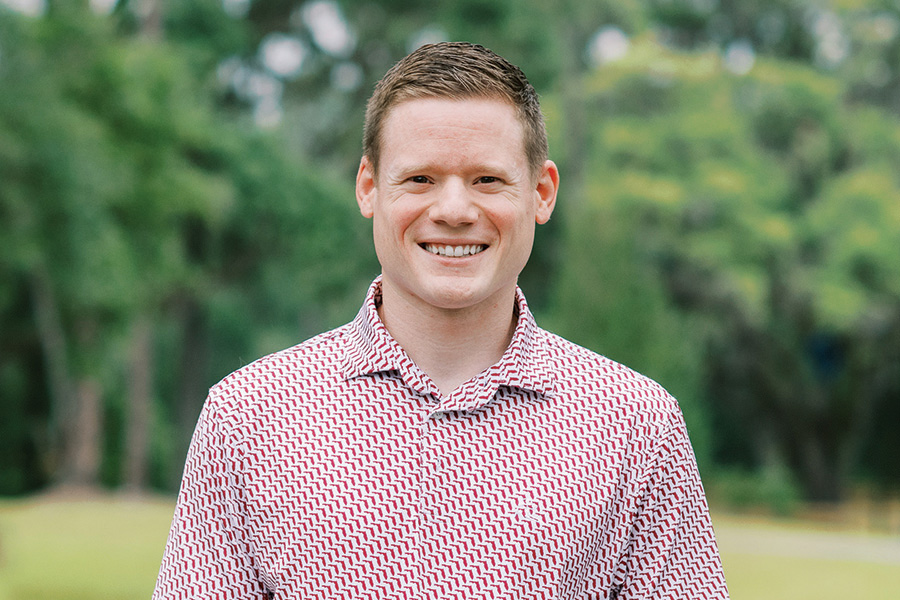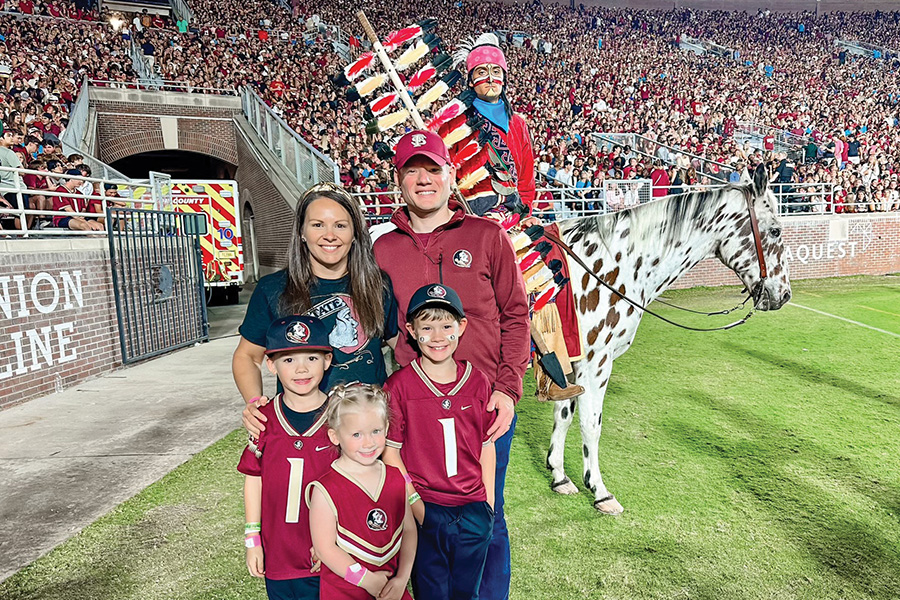Healing Hands
Biochemistry alumnus Jess DeLaune serves military veterans as they fight some of their toughest battles

When arriving at a doctor’s appointment, you’re most likely asked a series of questions about the reason for your visit and any symptoms. Physicians call this “the interview,” and it helps them gather information helpful in assessing illness and identifying treatments.
However, for medical oncologist and Florida State University alumnus Jess DeLaune, the social history questions, or information about a patient’s life outside of the reason for their visit, yield answers that can be among the most important elements of designing a successful treatment plan.
“It’s important to treat patients in a way that respects who they are and is in line with their goals and values,” said DeLaune, who graduated from FSU in 2010 with a bachelor’s from the Department of Chemistry and Biochemistry. “It’s easy to make assumptions, but without understanding the whole story, you might miss an opportunity to help someone.”
DeLaune went on to earn his medical degree in 2014 from the University of South Florida, receiving several awards for academic and clinical excellence, including the Doctor’s Doctor Award from his peers. While he remains a Seminole at heart, he currently serves as a medical oncologist at the Malcom Randall Department of Veterans Affairs Medical Center and assistant professor in the University of Florida’s Division of Hematology and Oncology in Gainesville.
“The patients at the VA have done so much for our country, and having the opportunity to give something back to them is incredibly meaningful,” DeLaune said. “They have particularly unique medical histories and circumstances because of their military service. Having them entrust what is sometimes the last few months and years of their life to my care is something I take seriously.”
For nearly three years, DeLaune has worked jointly at UF and the North Florida/South Georgia Veterans Health System, the largest VA health care system in the country, which provides primary care and specialty health services including mental health, gastroenterology, vision care, hearing loss treatment, cancer care, nutrition counseling, prescriptions, and rehabilitation services for more than 170,000 veterans.
As an oncology specialist, DeLaune treats cancer patients, particularly those with genitourinary cancers — prostate, kidneys, testes and bladder. While most doctors see their patients on a relatively infrequent basis, DeLaune was drawn to oncology for the unique opportunity to develop strong personal relationships with patients and to improve their quality of life during treatment.
“Though many of our patients pass away from their cancer, we have the tremendous honor of helping them live longer and better,” DeLaune said. “I respect the opportunity to help patients through such difficult times, even when it means helping them ‘die well,’ whatever that means to them.”

Beyond his clinical duties, DeLaune also dedicates time to training the next generation of physicians. He both directs and teaches UF’s first-year medical student oncology course in addition to being associate program director for UF’s Hematology/Oncology Fellowship Program, UFHOFP. He is also nearing the end of the American Society of Clinical Oncology’s year-long Education Scholars Program, which trains doctors to become more effective educators.
“Dr. DeLaune has a truly northward-facing moral compass,” said Martina Murphy, UFHOFP director and an associate professor of medicine in UF’s Division of Hematology and Oncology. “He makes decisions based on what is right, not necessarily what is easy. He cares deeply about his patients, his colleagues, his friends and most importantly, his family.”
At FSU, DeLaune first gravitated toward oncology while conducting research with Cottrell Family Professor of Chemistry and Biochemistry Igor Alabugin. In 2016, Alabugin and DeLaune published research in the Journal of the American Chemical Society documenting their redesign of the molecular structure of enediyne antibiotics, a type of antitumor drug, to be activated by light.
DeLaune played a major role in achieving this light sensitivity, which eventually led to an innovative approach to accelerating this reaction and development of new molecules with the potential to selectively break DNA in cancer cells.
“Jess is smart and motivated, so it was no surprise he did exceptionally well in my organic chemistry class, which is where we first met,” Alabugin said. “His intelligence and great work ethic made a real difference in the lab.”
DeLaune’s research interests and dedication have been cornerstones of his career — he helped develop a cancer research program at the Malcom Randall VA focused on experimental prostate cancer treatments — however, he credits his family for the resilience that keeps him going.
“There is no easy recipe … I just try to do the next right thing,” DeLaune said. “I definitely would not be where I am today without the support of my wife, Charlotte. There are some tough days in my line of work, so being able to come home to such a supportive family environment is invaluable.”
